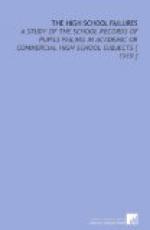But it is more probable that the attitude referred to operates to exclude the failing pupils from being freely permitted to enter the Regents’ tests in the failing subjects, and thus to restrain them from what threatens to lower the school percentage of successful papers, except that in New York City such discrimination is prohibited.[46] On the percentages of success for these examination results teachers and even schools are wont to be popularly judged. Annual school reports may feature the passing percentage for the school in Regents’ examinations, with a spirit of pride or rivalry, but with no word of what that percentage costs as real cost must be reckoned. It is interesting to note in this connection that the percentage of unsuccessful repetitions for the three New Jersey schools is 13.7 per cent lower than for the three New York schools. In addition to this, for the latter schools 22 per cent more of the subject failures are repeated than for the former ones mentioned. It is important also to bear in mind that the success percentage for the Regents’ tests is computed on the number admitted to the examinations—not on the number instructed in the subject. The regulations are flexible and admit of considerable latitude in matters of classification and interpretation. Accordingly, if it happens anywhere in the state that those who are the less promising candidates, in the teacher’s judgment, are debarred from attempting Regents’ examinations by failing marks, by demotion and exclusion from their class, or by other means, the school’s percentage of pupils passing may be kept high as a result, but the injustice worked upon the pupil in such manner is vicious and reprehensible. Yet the whole intolerableness of the practice will center in the rule for exclusion of pupils from these examinations because of school failure. No one can predict with any safe degree of certainty that the outcome of any individual’s efforts will be a failure in the Regents’ tests, even though he has failed in a school subject. If failure should happen to result, it is chiefly the school pride that suffers; if the pupil is denied a free trial, he may suffer an injustice to aid the pretension of the school. Our school sanctions are not characterized by such acumen or infallibility as to warrant our refusing to give a pupil the benefit of the doubt. He is entitled to his chance to win success in these examinations if he is able, and it appears that only results in the Regents’ tests can be truly trusted to tell us that he is or is not able to pass them.
The facts depicted here may lead to the belief that the recorded success in Regents’ examinations may sometimes be artificially high, due to the subtle influences at work to make it so. In New York City absence is the sole condition for debarring any pupil, since he must have pursued a subject the prescribed time. Such a ruling is highly commendable, and it should not in fairness to the pupil be otherwise anywhere in the state. The following distribution discloses that 72.8 per cent of the 3,085 failing pupils who were recorded as taking the Regents’ examinations were successful, and that 78 per cent of those succeeding passed in the same semester in which the school failure occurred.




